Looking for a Personalized Diet Plan?
Is Mango Good For Weight Loss?

By Asfia Fatima, Chief Dietitian at Clearcals
TLDR
- Mangoes are rich in antioxidants like xanthones, beta-carotene, and vitamins A, C, and D.
- Mangoes can aid weight loss when consumed in moderation.
- Limit to no more than two mangoes per day to support weight-loss goals.
For centuries, mangoes have been admired for their taste and nutritional benefits but scrutinized for their high sugar content.
The question arises: "Is mango good for weight loss?"
Let's take a closer look at what science says about mangoes and their role in a weight-loss journey.
What Makes Mango So Special?
Mangoes are more than just a delicious tropical fruit. They are loaded with essential nutrients and health-promoting properties, including:
- Antioxidants: Xanthones, beta-carotene, vitamins A, C, and D.
- Digestive Benefits: Promote regularity and reduce the risk of constipation.
- Heart Health: Help improve cardiovascular health.
- Immunity Boost: Strengthen the immune system.
Is Mango Good for Weight Loss?
Mangoes can indeed be part of a healthy weight-loss diet, but moderation is key. They are low in calories and fat, making them a good snack option. However, their high natural sugar content means you need to watch your portions.
A small cup (100 grams) of ripe Banganapalli mango contains:
- Calories: 40 kcal
- Sugar: 7.8 grams
- Fiber: 1.9 grams
While the fiber content can promote satiety, the high sugar levels necessitate mindful consumption.
Studies suggest that mango consumption may lower BMI, waist circumference, and body weight in certain populations, though overall fat reduction isn’t always significant.
Pro Tip: Use the Hint app to track your calorie and sugar intake when enjoying mangoes.
Best Time to Eat Mango for Weight Loss
The best time to enjoy mango is:
- As an afternoon snack.
- As a pre-or post-workout meal.
Eating mango around these times ensures that the natural sugars are utilized for energy, not stored as fat.
Does Mango Increase Weight?
While mangoes themselves don’t directly lead to weight gain, overconsumption can contribute to excess calorie intake, especially if paired with high-sugar or high-fat ingredients.
Does eating mango increase weight?
Only if eaten in excess or as part of a calorie-surplus diet.
Does mango help lose belly fat?
Indirectly, mangoes can support weight loss through fiber content and low fat, but they won’t specifically target belly fat.
Mango and Weight-Loss Diet Plans
The Hint app’s weight loss diet plan helps you incorporate mango in a balanced way. With features like calorie tracking and Pro Workouts, you can enjoy mango guilt-free while staying on track with your weight-loss goals.
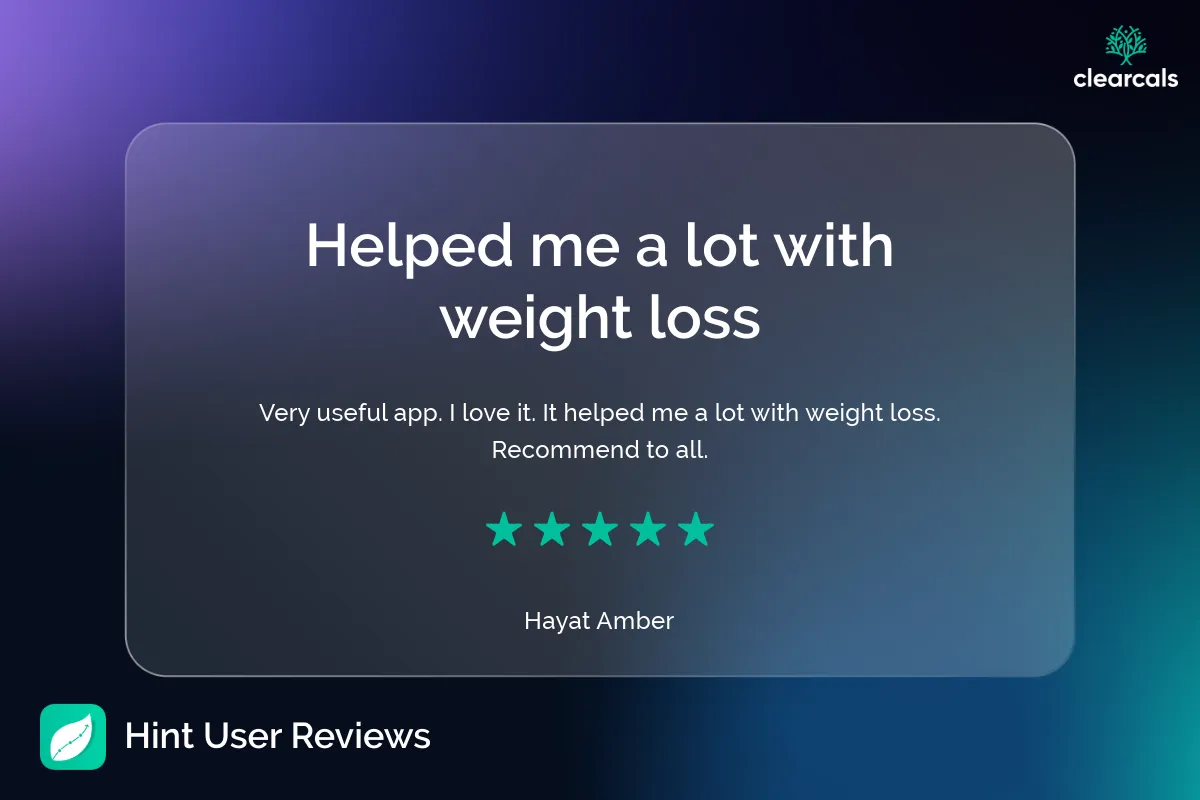
Mango Nutrition by Variety
The nutrition profile of mango changes based on the variety and the method involved during processing into canned, frozen, or dried.
Here is a comparison of varieties of mangoes available in India and their nutritional information per 100 grams to mangoes processed into canned, frozen, and dried forms.
| S.no | Mango varieties | Energy (Kcal) | Carbohydrates (grams) | Sugar (grams) | Fiber (grams) |
|---|---|---|---|---|---|
| 1 | Mango ripe banganapalli | 42 | 8 | 7.7 | 1.88 |
| 2 | Mango ripe Neelam | 43 | 8 | 7.9 | 1.77 |
| 3 | Mango ripe himsagar | 45 | 9 | 8 | 1.55 |
| 4 | Mango ripe paheri | 45 | 8.6 | 8.5 | 1.97 |
| 5 | Green mango | 49 | 11 | 2.4 | 3 |
| 6 | Mango ripe gulabkhas | 50 | 10 | 8 | 1.67 |
| 7 | Mango ripe Kesar | 55 | 11 | 9 | 2.02 |
| 8 | Mango ripe totapari | 59 | 13 | 9 | 1.73 |
| 9 | Mango canned | 60 | 15 | 14 | 1.6 |
| 10 | Mango frozen | 60 | 15 | 14 | 1.6 |
| 11 | Mango dried | 319 | 79 | 66 | 2.4 |
Takeaway: Fresh mangoes are better for weight loss compared to processed or dried forms, which have significantly higher sugar and calorie content.
Is Mango Juice Good for Weight Loss?
No. Juices contain added sugar, decrease the fiber content of whole fruit, and could lead to weight gain.
People think juice is a healthy drink, but it is low in fiber and high in sugars like fructose.
Increased intake of fructose leads to insulin resistance, which causes an increase in blood sugar levels, triglycerides, uric acid, fat deposition in the liver, obesity, and eventually type 2 diabetes.
Here we have compared the nutritional contents of mango versus mango juice using our HINT database.
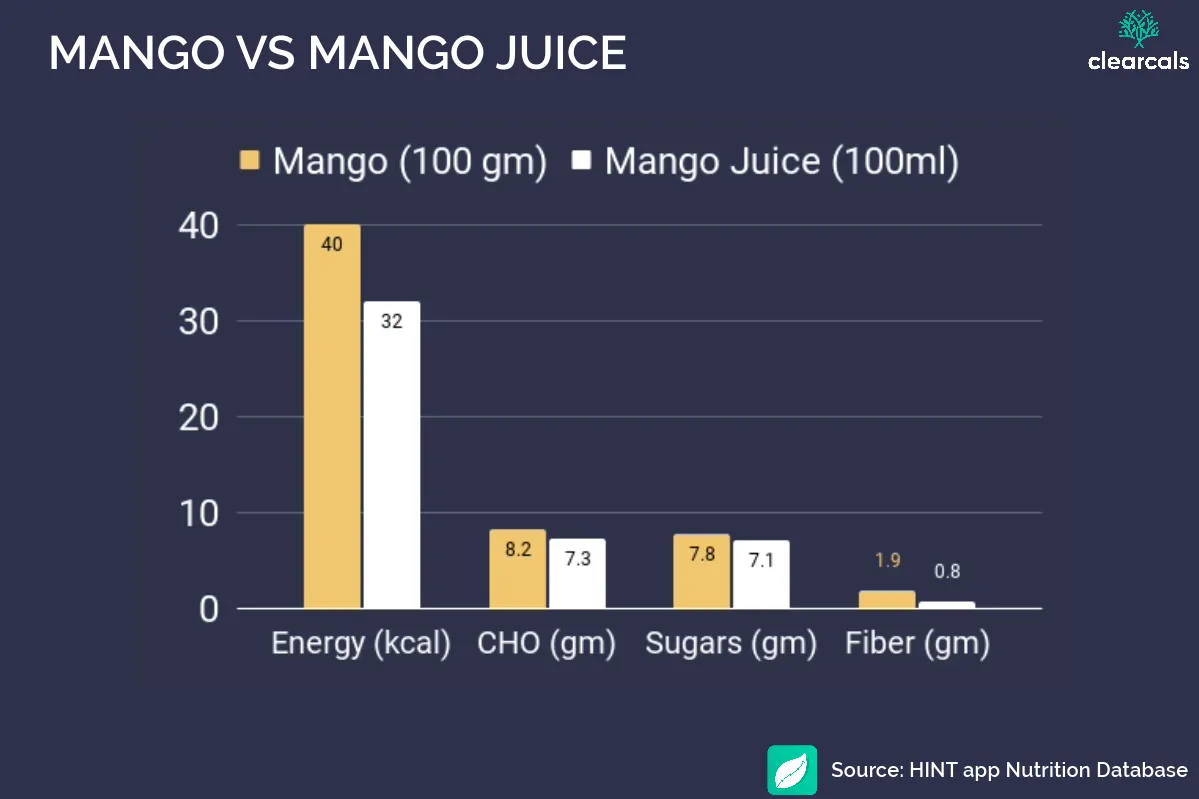
When you compare equal quantities of mango fruit (100 grams) and mango juice (100 mL), mango is higher in calories, carbs, sugar, and fiber compared to homemade mango juice.
However, no one consumes just 100 mL of juice as they feel less satiated with juice, and usually a glass full is the typical serving size for any sugar-sweetened liquid beverage.
In such a case, from a practical point of view, an ideal comparison would be between a piece of mango (100 grams) and 1 glass (240 mL) of mango juice, shown in the table below.
| Nutritional Information | 100 grams of Mango | 1 glass of Mango Juice |
|---|---|---|
| Calories (kcal) | 40 | 77 |
| Carbohydrates (grams) | 8.2 | 17.5 |
| Protein (grams) | 0.5 | 0.5 |
| Fat (grams) | 0.6 | 0.5 |
| Sugar (grams) | 7.8 | 17 |
| Fiber (grams) | 1.9 | 1.8 |
| Sodium (mg) | 1.0 | 1.1 |
This comparison, clearly highlights that even drinking home-made mango juice could lead to higher calorie, carbohydrate, and sugar consumption.
Now if you compare this with the same quantities (100 mL) of commercially available branded mango juices such as Frooti, Maaza, Slice, and Tropicana Mango Delight, the difference in calories, carbs, and sugar is much more significant.
They are high in added sugars, flavors, and preservatives. They lack fiber and protein and are high in sugar as shown below in the graph.
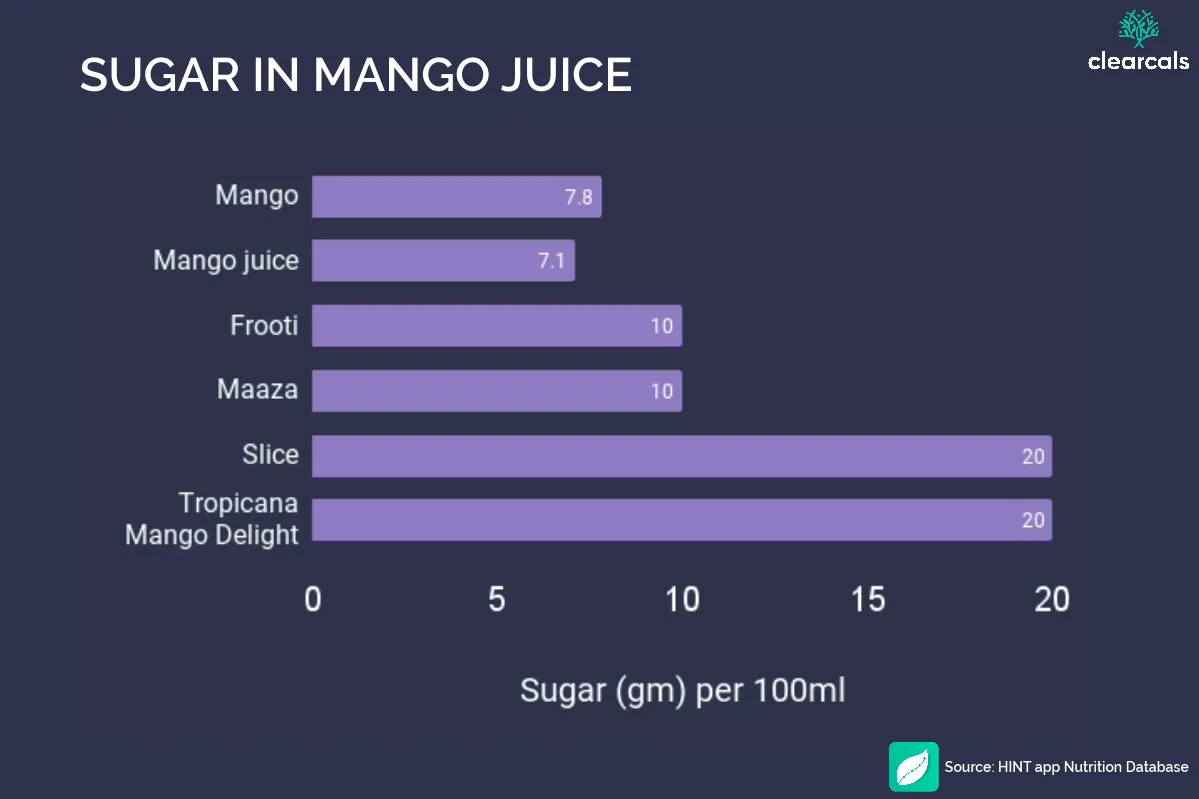
Hence, make a note that whenever you are buying a branded mango juice, have a look at the nutrition label, composition, and ingredients before you pick up a carton.
Nowadays, in addition to mango juice, the market is flooded with a variety of commercially prepared mango milkshakes, lassi, and smoothies. Let's check if they contribute to weight loss or weight gain.
Are mango milkshakes, mango smoothies, mango lassi, and mango ice cream good for weight loss?
Mango-based beverages and desserts like mango milkshakes, mango smoothies, mango lassi, and mango ice cream are generally not considered ideal for weight loss due to their calorie and sugar content.
While mangoes themselves are a delicious and nutritious fruit, the preparation methods and additional ingredients used in these treats can significantly increase their caloric and sugar content.
1. Mango Milkshake
Traditional mango milkshakes often contain whole milk, sugar, and sometimes even ice cream, which can lead to a high-calorie beverage with added sugars.
Mango Milkshake Calories
One glass (240ml): 207 kcal (with sugar and full-fat milk).
Is mango shake good for weight loss?
No, unless made without added sugar and with low-fat milk.
2. Mango Smoothie
Smoothies can be a healthier option if they are made with fresh mangoes, low-fat milk or yogurt, and minimal added sugars.
However, some smoothies available commercially can be loaded with added sugars and high-calorie ingredients, so it's essential to check the ingredients.
3. Mango Lassi
Mango lassi is a popular Indian drink made with yogurt, sugar, and mango. While yogurt provides some health benefits, the added sugar may make it less suitable for weight loss
4. Mango Ice Cream
Mango ice cream is typically high in calories and added sugars, making it a less suitable option for those trying to lose weight.
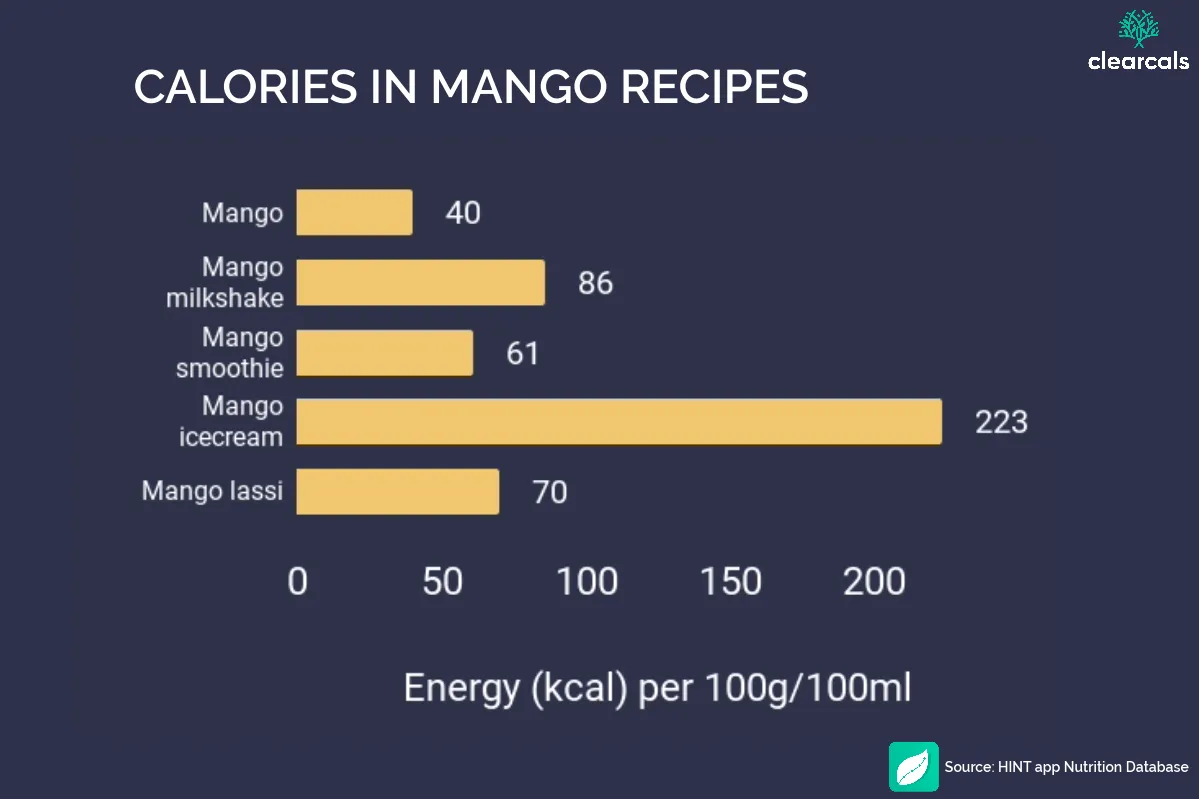
The graph above displays the calorie content of various mango recipes, revealing that they are higher in calories when compared to a whole mango.
It's important to note that liquid calories, like those found in mango smoothies or milkshakes, don't provide the same feeling of fullness as solid calories do.
This lack of satiety might lead you to eat more even when you're not hungry, making weight loss more challenging and less likely.
What's concerning is that these liquid options can add hundreds of extra calories to your daily meal plan.
Furthermore, the carbohydrate content in these recipes is also higher compared to just eating a whole mango, as illustrated in the next graph.
This higher carbohydrate intake from mango smoothies, lassi, and milkshakes suggests that they may not be the best choice for weight loss.
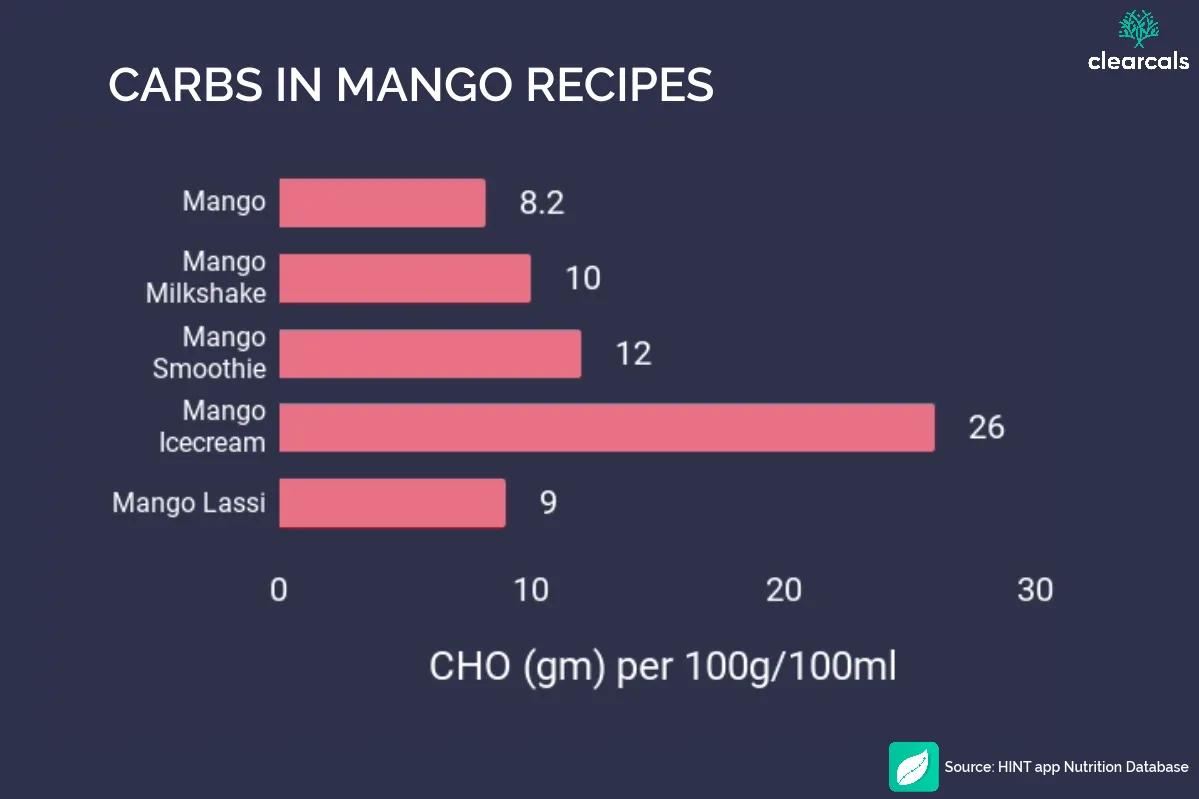
Eating sugary foods with no nutritional value can lead to obesity and weight gain. Mango ice cream, smoothies, lassi, and milkshakes have a high sugar content compared to fresh mangoes. Including these foods regularly can hinder weight loss efforts.
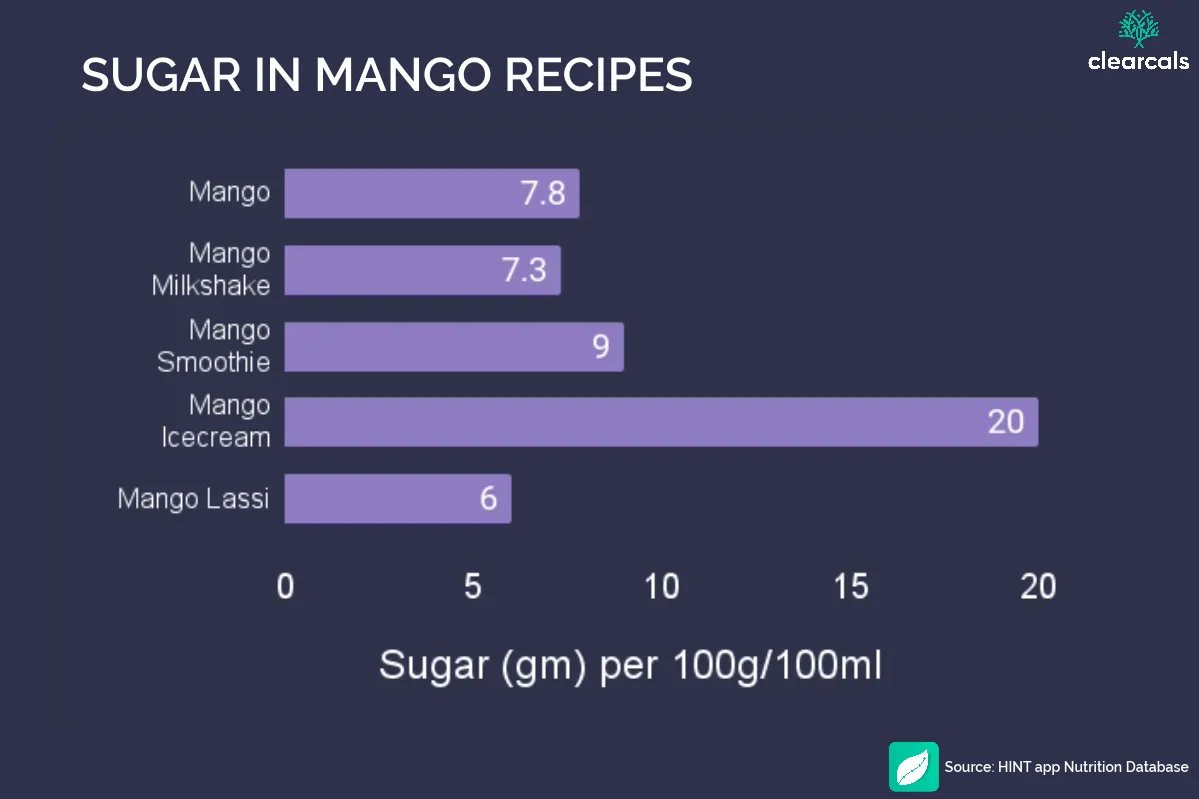
Fiber is essential for weight management because it helps you feel full and satisfied after eating. Foods that are high in fiber can support weight loss efforts.
Let's look at the fiber content in different mango recipes.
Ice cream has no fiber at all. Mango milkshakes, lassi, and smoothies have less fiber than a whole mango, making them less suitable for weight loss compared to simply eating whole fruit.
If you want to lose weight, it's better to choose whole mangoes or other high-fiber foods to help you stay full and on track with your goals.
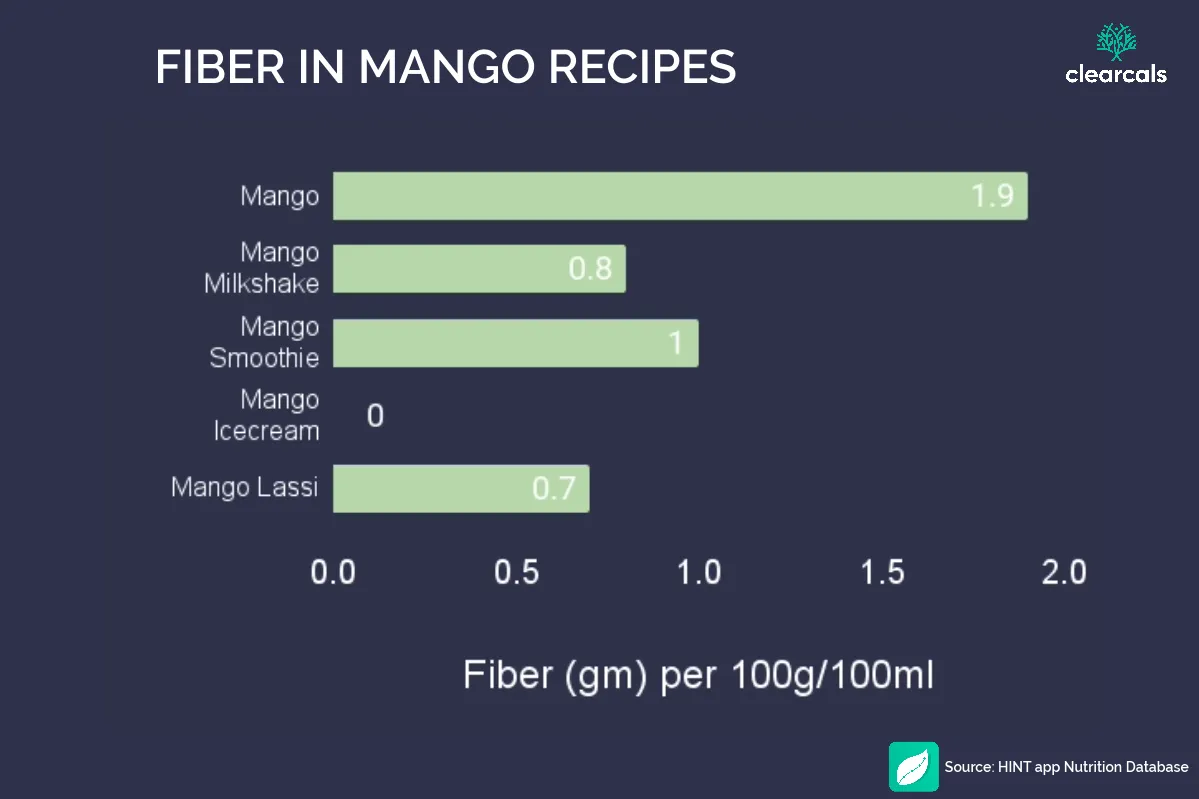
For a healthier option, consider making your mango-based beverages at home, using fresh mangoes, reduced-fat or plant-based milk, and limiting added sugars.
Additionally, you can also incorporate mangoes into a fruit salad or eat them on their own for a satisfying and nutritious snack.
Remember that portion control and moderation are key when trying to achieve weight loss or maintain a healthy weight.
FAQS
1. Are Mango Leaves Good For Weight Loss?
Yes. Studies quote that the extracts of Mango leaves act as an anti-obesity agent and demonstrate hepatoprotective action due to the presence of bioactive compounds such as phenolic compounds, flavonoids, benzophenones, sesquiterpenes, saponins, xanthones, tannins, terpenoids, and alkaloids.
2. Is Mango Pickle Good For Weight Loss?
No. Though mango pickle is rich in antioxidants and relieves digestion, nausea, loss of appetite, and motion sickness, it is not a good option to consume daily or for weight loss purposes as it is high in saturated fat and also sodium.
3. Is Dried Mango Good For Weight Loss?
No. Dried mango is high in sugar when compared to its fresh form. Some prepackaged types further increase the sweetness with additional sugar.
4. Is Raw Mango Good For Weight Loss?
Yes. Raw Mango contains more fiber compared to its other forms. It provides satiety, keeps you full, and increases metabolism, which aids in weight loss. But remember, moderation is the key.
5. What is the Best Time To Eat Mango For Weight Loss?
The best time to include mango in the diet is either to have it as a snack in the afternoon or as a pre- or post-workout meal.
6. Does a mango shake increase weight?
Yes, if made with added sugar and full-fat milk.
7. Is Frooti good for health?
No, Frooti and other branded mango drinks are high in added sugars and preservatives.
8. Does mango make you fat?
Not inherently, but overconsumption can lead to weight gain.
9. When to eat mango—before or after a meal?
Ideally, eat a mango as a snack or pre-/post-workout to avoid overeating.
Conclusion
Mangoes are a nutrient-rich fruit that can be part of a weight-loss diet when consumed in moderation.
Their fiber content and low-calorie count make them a better choice than sugary beverages or processed mango products.
For those aiming to shed pounds, the Hint app offers a comprehensive solution with free calorie tracking, macronutrient monitoring, and structured weight-loss diet plans through Hint Pro and Hint Premium.
Pair these tools with a personalized fitness routine, and mango can become a healthy, satisfying addition to your weight-loss journey.
So go ahead, enjoy mangoes—but keep portion control in mind and use the Hint app to stay on track!
About the Author
Asfia Fatima is the Chief Dietitian at Clearcals, with a Master’s Degree in Dietetics and Clinical Nutrition and over a decade of experience in clinical nutrition and lifestyle management.
She specializes in evidence-based diet planning for weight loss, diabetes, and metabolic health.
At Clearcals, she leads the nutrition strategy behind the Hint app, helping users achieve their goals with science-backed guidance.
🔗 Connect with Asfia on LinkedIn





